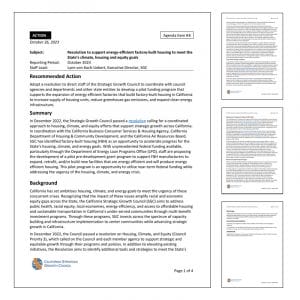MBI Solves Relocatable Building Code Issues in Atlanta
MBI stepped in to assist a large fleet owner member overcome government confusion

Relocatable buildings, like these structures from Aries Building Systems, can be used for a wide variety of functions, including classrooms, offices, and temporary housing. Sometimes, however, there’s confusion and disagreement within state and local governments over which requirements of the International Building Code should be used to certify these structures.
Relocatable buildings are defined in the International Existing Building Code as “partially or completely assembled buildings constructed and designed to be reused multiple times and transported to different building sites.”
Unlike the federally regulated HUD Code manufactured housing industry, the modular construction industry is regulated primarily at the state and local levels by code and agency administrators. As with site-built structures, the modularly constructed facility must meet the local codes where the building is to be located.
The trouble is, however, that sometimes there’s disagreement over which version of the codes should be used, particularly when it comes to relocatable buildings.
Confusion in the South
In late January, a fleet owner member of the Modular Building Institute (MBI) contacted Jon Hannah-Spacagna, the MBI’s government affairs director, to report that they were having permitting issues in Atlanta which had forced them to cancel some projects and were holding up others.
The center of this issue was that the city was trying to require the company to bring all their relocatable structures up to the 2018 International Building Code (IBC), the version of the code currently recognized in Georgia. According to the company’s regional general manager, “The feedback we got was, ‘Your plans are not up to date, you need to bring them up to code.’”
It didn’t take long for Hannah-Spacagna to confirm that there was, in fact, no code issue with the buildings. “That day I made a call to Georgia’s modular program director,” said Hannah-Spacagna, “and confirmed that the 2018 codes weren’t required for existing relocatable buildings.”
Following that call, Hannah-Spacagna connected the company—now armed with the facts from the state’s modular program director—with Atlanta’s deputy building official. It seemed a quick fix.
Not So Fast...
In the second week of February, Hannah-Spacagna received another call from the same member—despite attempts to resolve the issue on their own—they were still having issues with the city’s requirements for certification of their structures. Hannah-Spacagna immediately scheduled a call between the city and the member’s leadership team.
During the call, the city’s inspectors were trying to require new labeling on all existing and previously labeled relocatable structures, including classrooms, stating the units needed a new label and had to be brought up to 2018 codes. Estimates for that type of upgrade are about $3,000 to $4,000 per unit, and this member company had about 2,000 units in question.
Huge Savings for the Industry
Understanding what was at stake (a setback of up to $8 million in upgrades alone), Hannah-Spacagna quickly referenced Section 3113 of the 2018 IBC—which MBI wrote and had incorporated into the code. This section specifically distinguished between a newly constructed versus an existing relocatable structure. For existing structures, the IBC does not apply. Rather code officials are instructed to refer to the International Existing Building Code (IEBC) which doesn’t require the units to be brought up to new codes or have a new label (unless it has been modified).
The city’s deputy building official agreed with Hannah-Spacagna and confirmed with the department’s counsel about their misunderstanding of the codes.
“MBI works with members every day to remove obstacles and resolve regulatory and legislative issues like these, said Hannah-Spacagna. “If you need assistance, contact MBI, we can help. Membership has its privileges!”
About the Author: John McMullen is the marketing director for the Modular Building Institute. He can be reached at mcmullen@modular.org.
Additional Government Affairs Articles
A Huge Win for the Modular Construction Industry in Massachusetts
In early February, 2024, the Massachusetts Board of Building Regulations and Standards (BBRS) released its proposed 10th Edition building codes. This draft included several amendments targeting modular construction that would have created an extremely difficult environment for the entire modular industry and could have eliminated the industry entirely in the state.
Read Complete ArticleFEMA Announces Hawaii Housing Plan Using Modular Construction
Utah becomes the second state in the country, following Virginia, to fully adopt ICC/MBI standards 1200 and 1205. MBI will continue to work with leadership in Utah to implement the new program.
Read Complete ArticleICC/MBI Standards 1200 & 1205 Provide Foundation for Utah’s First-Ever State Modular Program
Utah becomes the second state in the country, following Virginia, to fully adopt ICC/MBI standards 1200 and 1205. MBI will continue to work with leadership in Utah to implement the new program.
Read Complete ArticleBuilding at the Intersection of Housing Affordability & Energy Conversation
Tasked with looking at how the state of California can best house its growing population while meeting its aggressive energy, housing, transportation, land use, and equity goals, the California Strategic Growth Council (SGC) faces a slew of challenges. But, if the outlook of SGC Executive Director Lynn von Koch-Liebert is any indication, it’s only a matter of time before those challenges are successfully met.
Read Complete Article



